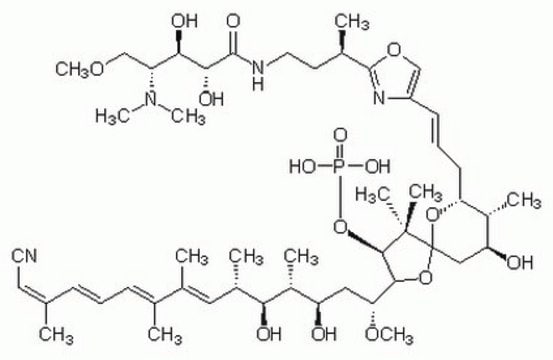459618
Okadaic Acid potassium salt
≥95% (HPLC), solid, protein phosphatase 2A and protein phosphatase 1 inhibitor, Calbiochem®
Sinónimos:
Okadaic Acid, Potassium Salt
About This Item
Productos recomendados
product name
Okadaic Acid, Potassium Salt, Water-soluble analog of Okadaic Acid. Inhibits protein phosphatases 1 and 2A.
Quality Level
assay
≥95% (HPLC)
form
solid
manufacturer/tradename
Calbiochem®
storage condition
OK to freeze
protect from light
color
white
solubility
water: 1 mg/mL
DMSO: 20 mg/mL
ethanol: 20 mg/mL
shipped in
ambient
storage temp.
−20°C
InChI
1S/C44H68O13.K/c1-25-21-34(55-44(23-25)35(46)12-11-31(54-44)24-41(6,50)40(48)49)26(2)9-10-30-14-18-43(53-30)19-15-33-39(57-43)36(47)29(5)38(52-33)32(45)22-28(4)37-27(3)13-17-42(56-37)16-7-8-20-51-42;/h9-10,23,26-28,30-39,45-47,50H,5,7-8,11-22,24H2,1-4,6H3,(H,48,49);/q;+1/p-1
InChI key
UXRQUXBFVICHQJ-UHFFFAOYSA-M
General description
Biochem/physiol Actions
PP1, PP2
Warning
Reconstitution
Other Notes
Kiguchi, K., et al. 1994. Cell Growth Differ.5, 995.
Ohaka, Y., et al. 1993. Biochem. Biophys. Res. Commun.197, 916.
Gopalakrishna, R., et al. 1992. Biochem. Biophys. Res. Commun.189, 950.
Kreienbuhl, P., et al. 1992. Blood80, 2911.
Nomura, M., et al. 1992. Biochemistry31, 11915.
Song, Q., et al. 1992. J. Cell Physiol.153, 550.
Tada, Y., et al. 1992. Immunopharmacol.24, 17.
Legal Information
signalword
Danger
hcodes
Hazard Classifications
Acute Tox. 3 Dermal - Acute Tox. 3 Inhalation - Acute Tox. 3 Oral - Skin Irrit. 2
Storage Class
6.1C - Combustible acute toxic Cat.3 / toxic compounds or compounds which causing chronic effects
wgk_germany
WGK 3
flash_point_f
Not applicable
flash_point_c
Not applicable
Certificados de análisis (COA)
Busque Certificados de análisis (COA) introduciendo el número de lote del producto. Los números de lote se encuentran en la etiqueta del producto después de las palabras «Lot» o «Batch»
¿Ya tiene este producto?
Encuentre la documentación para los productos que ha comprado recientemente en la Biblioteca de documentos.
Nuestro equipo de científicos tiene experiencia en todas las áreas de investigación: Ciencias de la vida, Ciencia de los materiales, Síntesis química, Cromatografía, Analítica y muchas otras.
Póngase en contacto con el Servicio técnico








